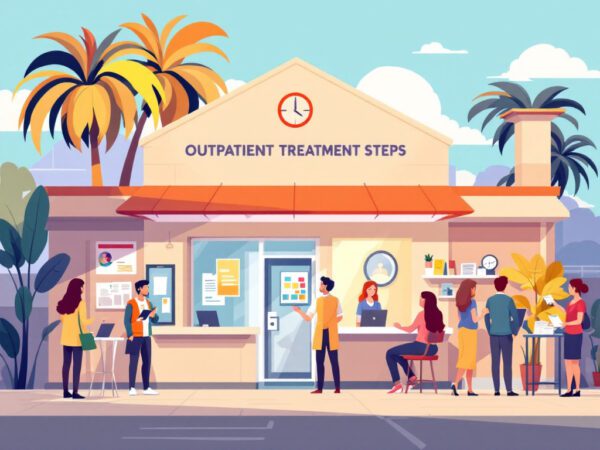Totality Treatment: A Comprehensive Approach
At Totality Treatment, we believe in a holistic perspective when it comes to addressing addiction and mental health issues. Our approach combines professional addiction therapy programs with evidence-based treatment methods to ensure that each individual receives the highest standard of care.
Professional Addiction Therapy Programs
We provide structured programs designed to meet the unique needs of those struggling with substance use disorders. Our professional addiction therapy encompasses various therapeutic modalities, including cognitive-behavioral therapy (CBT) and dialectical behavior therapy (DBT).
CBT is a structured, one-on-one psychotherapy method aimed at reshaping negative thoughts, helping individuals tackle life’s challenges (NAATP). This can be particularly effective for those grappling with addiction. DBT, a variation of CBT, focuses on developing behavioral skills that assist individuals in managing emotions, resolving conflicts, and improving relationships (NAATP).
By leveraging these professional therapy programs, we can help create tailored paths to recovery that fit the context and circumstances of each participant.
Evidence-Based Treatment Methods
Our commitment to evidence-based practices ensures that we apply the most effective treatment strategies for individuals in our outpatient programs. This approach involves utilizing treatment modalities that have been supported by rigorous scientific research.
Evidence-based treatment has been shown to improve recovery outcomes and overall health, addressing both the physical and psychological aspects of addiction. This includes medication-assisted treatments, which utilize FDA-approved medications to support individuals in recovery, especially in cases of opioid or alcohol use disorders.
Below is a summary of some key evidence-based practices used in our programs:
| Treatment Method | Description |
|---|---|
| Cognitive-Behavioral Therapy (CBT) | Restructures negative thought patterns to help manage addiction and mental health challenges. |
| Dialectical Behavior Therapy (DBT) | Aids in emotional regulation and interpersonal effectiveness, thereby improving relationships and reducing symptoms. |
| Medication-Assisted Treatment | Utilizes medications like Methadone and Buprenorphine for opioid use, or Disulfiram for alcohol use, to support recovery. |
Our comprehensive treatment plans address various needs, combining therapies and medications to create an effective outpatient experience. For more details, explore our offerings in outpatient addiction treatment and intensive outpatient programs. We are dedicated to providing the necessary tools and resources for successful recovery journeys.
Understanding Addiction Treatment Options
Choosing the right treatment options is vital for recovery from addiction. At Totality Treatment, we offer a variety of methods designed to meet individual needs and promote long-lasting recovery.
Cognitive and Behavioral Therapies
Cognitive-behavioral therapy (CBT) is a structured one-on-one psychotherapy approach that has proven effective in treating mental disorders and addiction. By reshaping negative thoughts, CBT helps individuals manage challenges and can exist as a standalone treatment or in combination with other therapies to manage symptoms effectively (NAATP).
This type of therapy equips individuals with practical skills to cope with stressors, ultimately decreasing the likelihood of relapse. We believe in utilizing evidence-based practices, including various types of therapy that combine medications when necessary, to foster better outcomes for our patients.
| Therapy Type | Focus | Effectiveness |
|---|---|---|
| Cognitive Behavioral Therapy | Reshapes negative thought patterns | High, especially for addiction |
| Combination Therapy | Uses CBT with other therapy forms | Highly effective |
Family Involvement in Treatment
Family involvement is a crucial element in the addiction treatment process. Family therapy widens the focus from the individual to the entire family, facilitating meaningful discussions and problem-solving sessions. This approach enhances the understanding of addiction as a disease and helps families develop strategies to support their loved ones throughout recovery (NAATP).
Effective family involvement can lead to better recovery outcomes, as it strengthens the support network around the individual and addresses any familial patterns that may contribute to the addiction.
Individualized Treatment Plans
At Totality Treatment, we emphasize the importance of personalized treatment plans tailored to each individual’s unique needs and circumstances. By understanding specific challenges and preferences, we can design an effective approach that maximizes the chances for successful recovery.
Individualized treatment plans may incorporate a range of evidence-based practices and therapies, including medication-assisted treatments, which have been shown to improve outcomes. Our objective is to create a comprehensive and adaptable framework, allowing for adjustments as the individual progresses through their recovery journey.
| Key Features of Individualized Plans | Benefits |
|---|---|
| Tailored strategies | Increases engagement and effectiveness |
| Flexibility to adapt | Responds to changing needs |
| Integration of multiple therapies | Addresses complex issues |
Choosing the right outpatient addiction treatment starts with understanding the various therapeutic methodologies available. We are committed to helping you or your loved one find the most suitable path to recovery.
Benefits of Outpatient Treatment Programs
Outpatient treatment programs offer several advantages, crucial for individuals seeking support in their recovery journey. We recognize the importance of these benefits, which include flexibility and accessibility, continuity of care, and cost-effectiveness.
Flexibility and Accessibility
One significant benefit of outpatient addiction and mental health programs is their flexibility and accessibility. Outpatient treatment allows individuals to receive care while maintaining their daily responsibilities, such as work, family, and social commitments. According to the Substance Abuse and Mental Health Services Administration (SAMHSA), outpatient alcohol and substance use treatment offers a higher level of accessibility, enabling more people to seek help and receive necessary support for their recovery journey. This means that individuals can attend therapy sessions and group activities based on their schedules, making it easier for them to integrate treatment into their lives.
| Benefit | Description |
|---|---|
| Flexibility | Attend sessions during convenient times, balancing recovery with daily obligations. |
| Accessibility | Available to a larger number of individuals, allowing for broader engagement in treatment. |
Continuity of Care
Continuity of care is another vital benefit of outpatient programs. These programs provide consistent therapeutic support, ensuring individuals receive ongoing assistance as they transition from detox or more intensive treatment settings. Outpatient treatment emphasizes individualized plans tailored to meet unique needs, addressing specific challenges and underlying causes of addiction. According to SAMHSA, this continuous care is crucial for achieving positive outcomes, enabling individuals to remain engaged in their recovery process without interruption.
| Aspect | Description |
|---|---|
| Consistency | Ongoing support helps maintain motivation and accountability in recovery efforts. |
| Individualized Plans | Treatment is customized, accounting for co-occurring mental health issues and personal circumstances. |
Cost-Effectiveness
Outpatient programs are generally more cost-effective compared to residential or inpatient options. The National Institute on Drug Abuse (NIDA) highlights this financial advantage, making quality addiction treatment more accessible. The affordability of outpatient treatment presents an appealing option for many individuals and families. Cost-effective solutions ensure that individuals can receive proper care without enduring significant financial strain—an essential factor when considering treatment options.
| Cost Comparison | Residential/Inpatient | Outpatient |
|---|---|---|
| Average Cost | High | Lower |
| Insurance Coverage | Often requires copays or higher deductibles | Frequently more covered, resulting in less out-of-pocket expense |
Choosing an outpatient treatment program can provide essential support on the path to recovery while offering flexibility, continuity, and affordability. If you’re interested in exploring specific programs, consider reviewing our resources on outpatient addiction treatment or different options like the intensive outpatient program. Together, we can forge a path towards healing and empowerment.
Types of Outpatient Therapy
When considering options for treatment, different types of outpatient therapy can be effective in supporting recovery from addiction and mental health challenges. Below, we outline three key outpatient therapy modalities: Dialectical Behavior Therapy (DBT), Experiential Therapy Techniques, and Eye Movement Desensitization and Reprocessing (EMDR).
Dialectical Behavior Therapy (DBT)
Dialectical Behavior Therapy (DBT) is a specialized form of Cognitive Behavioral Therapy (CBT) that emphasizes the development of practical skills for managing emotions and improving interpersonal relationships. This therapy helps individuals to address conflicts and enhances their ability to cope with stress. Research indicates that DBT has successful outcomes in both addiction treatment and various mental health diagnoses (NAATP).
DBT consists of four main components:
- Mindfulness skills promote awareness of the present moment.
- Distress tolerance skills enhance coping mechanisms during crises.
- Emotional regulation skills help to manage and transform intense emotions.
- Interpersonal effectiveness skills improve communication and relationship-building.
Experiential Therapy Techniques
Experiential therapy employs emotionally engaging activities such as role-playing and guided imagery to facilitate hands-on learning. This approach caters particularly well to individuals who are in the early stages of recovery from substance use disorders, offering them practical tools to confront their feelings and experiences (NAATP).
By involving clients in active participation, experiential therapies can:
- Foster emotional expression and insight.
- Encourage personal reflection and connection to past experiences.
- Promote healing through action-oriented activities.
Eye Movement Desensitization and Reprocessing (EMDR)
Eye Movement Desensitization and Reprocessing (EMDR) is a unique psychotherapeutic technique designed to tackle emotional distress and trauma symptoms. Since its inception in the 1980s, EMDR has been supported by over 30 positive controlled outcome studies, showcasing its effectiveness (NAATP).
The key elements of EMDR include:
- Targeting traumatic memories for reprocessing.
- Utilizing bilateral stimulation (typically through guided eye movements) to help clients process information more adaptively.
- Allowing individuals to develop new positive beliefs about themselves and their experiences.
These therapies represent a few of the many options available for those seeking outpatient addiction treatment programs. Each modality can play a critical role in our recovery journey and offer supportive pathways to healing. For additional insights, we also recommend exploring our intensive outpatient program and partial hospitalization program.
Successful Recovery Strategies
In our journey towards recovery, we recognize several successful strategies that can substantially improve outcomes for individuals grappling with addiction. These include medication-assisted treatments, relapse prevention and support systems, and personalized recovery plans.
Medication-Assisted Treatments
Medications play a crucial role in treating substance use disorder. They can modify brain chemistry, alleviate cravings, and manage withdrawal symptoms. The U.S. Food and Drug Administration (FDA) has approved various medication-assisted treatments that are considered effective for individuals struggling with addiction, particularly to opioids and alcohol.
Common medication types used in treatment include:
| Substance | Medication Examples |
|---|---|
| Opioid Use Disorder | Methadone, Buprenorphine |
| Alcohol Use Disorder | Disulfiram, Acamprosate |
| Withdrawal Management | Benzodiazepines, Anticonvulsants |
Medications are often utilized during both the detoxification phase and maintenance phase of treatment (American Addiction Centers). This approach caters to individual needs, allowing for a comprehensive treatment experience.
Relapse Prevention and Support Systems
Relapses can frequently occur during recovery from substance use disorder (SUD), making relapse prevention a vital component of our strategy. When individuals return to a substance after stopping treatment, they may need to go through detoxification again and restart the treatment cycle (Cleveland Clinic). To reduce the risk of relapse, a strong support system is essential.
This support can come from:
- Peer Support Groups: Sharing experiences with others who have overcome similar struggles can provide encouragement.
- Family Involvement: Engaging loved ones in the recovery process can foster accountability and connection.
- Case Management Services: Professionals who assist individuals in navigating their recovery journey ensure their needs are met and provide ongoing support.
We encourage individuals to leverage available resources and establish connections that can help them stay on track during their recovery journey.
Personalized Recovery Plans
Each person’s journey to recovery is unique, and a personalized recovery plan addresses individual needs and circumstances. Creating tailored recovery strategies involves understanding the specific challenges and goals of each individual.
Factors considered in personalized plans include:
- Substance Use History: Understanding the duration and severity of addiction.
- Co-occurring Conditions: Addressing any mental health issues concurrently affecting the recovery process.
- Lifestyle Considerations: Tailoring treatment to fit personal and professional commitments.
By focusing on individualized intensive programs, we can enhance the effectiveness of the treatment received. For more insights into personalized strategies, explore information about our individualized intensive program.
Incorporating these successful strategies into our recovery process can improve the likelihood of achieving long-term success. Engaging with professional support and utilizing evidence-based practices ensures that individuals have the best tools available for their journey towards a healthier life.
Comparing Inpatient vs. Outpatient Programs
When considering the best treatment options for addiction, understanding the differences between inpatient and outpatient programs is crucial. We have identified key factors such as duration and cost, treatment intensity, and the importance of consulting with medical professionals to help guide our decision-making process.
Duration and Cost Factors
Inpatient rehab typically requires a longer commitment, often ranging from 30 to 90 days, depending on individual needs. In contrast, outpatient treatment provides flexibility, allowing participants to engage in their daily lives while receiving care.
| Treatment Type | Duration | Estimated Cost |
|---|---|---|
| Inpatient | 30-90 days | $2,000 – $40,000/month |
| Outpatient | Varies | Under $1,000 |
Outpatient treatment generally costs significantly less than inpatient options. The average cost for outpatient rehabilitation is typically under $1,000, making it a more affordable choice for those seeking assistance (The Recovery Village).
Treatment Intensity and Effectiveness
Outpatient treatment programs focus on personalized care, addressing specific challenges and underlying causes of addiction. This tailored approach enhances the effectiveness of the interventions utilized. According to the National Institute on Drug Abuse (NIDA), outpatient therapy is often more effective in providing continuous support and adapting to the needs of individuals throughout their recovery journey, thus reducing the risk of relapse (Kolmac Integrated Behavioral Health Centers).
While inpatient treatment is typically more intensive due to the around-the-clock support, outpatient programs provide a structured environment where individuals can develop skills to maintain their recovery while integrating back into daily life.
Consultation with Medical Professionals
Consulting with healthcare providers is essential for any individual or loved one exploring treatment options for addiction. Medical professionals can offer valuable insights into the suitability of inpatient versus outpatient programs based on personal circumstances, support systems, and mental health considerations. Engaging with a professional helps ensure the selection of the most appropriate program tailored to the individual’s unique needs and circumstances.
For those interested in outpatient treatment, we suggest exploring options such as outpatient addiction treatment or intensive outpatient programs that emphasize flexibility and personalized care. By seeking professional advice, we can make informed decisions and access the most effective treatment paths available to us.















